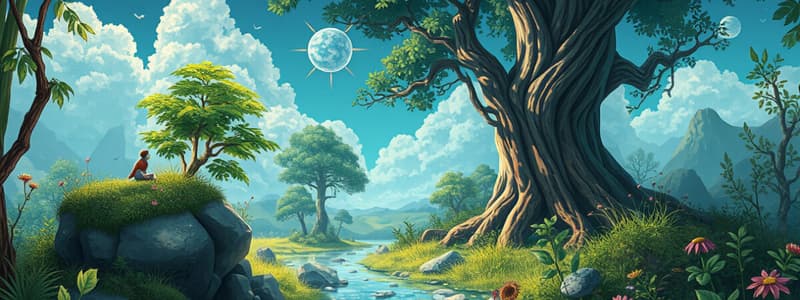Podcast
Questions and Answers
Which of the following best describes the role of decomposers in an ecosystem?
Which of the following best describes the role of decomposers in an ecosystem?
- They exclusively consume only animal matter.
- They produce their own food using sunlight.
- They recycle nutrients by feeding on decomposing organic matter. (correct)
- They break down inorganic substances into organic nutrients.
Which group of organisms is primarily responsible for synthesizing organic nutrients from inorganic substances in an ecosystem?
Which group of organisms is primarily responsible for synthesizing organic nutrients from inorganic substances in an ecosystem?
- Autotrophs (correct)
- Omnivores
- Heterotrophs
- Decomposers
What distinguishes a grazing food chain from a detritus food chain?
What distinguishes a grazing food chain from a detritus food chain?
- A grazing food chain primarily involves herbivores, while a detritus chain involves decomposers. (correct)
- A grazing food chain consists of biotic components only, while a detritus chain involves abiotic components.
- A grazing food chain operates in aquatic environments, while a detritus chain operates in terrestrial environments.
- A grazing food chain includes only plant producers, while a detritus chain includes only animal consumers.
Which of the following is NOT considered an abiotic component of an ecosystem?
Which of the following is NOT considered an abiotic component of an ecosystem?
In a food web, how are food chains interconnected?
In a food web, how are food chains interconnected?
Flashcards are hidden until you start studying
Study Notes
Ecosystem
- Defined as a natural unit with living (biotic) and non-living (abiotic) components interacting in a self-sustaining manner.
Components of the Ecosystem
- Two primary components:
- Biotic component: Consists of all living organisms that interact within the ecosystem.
- Abiotic component: Encompasses physical and chemical factors such as temperature, humidity, sunlight, water, and air.
Biotic Components
- Autotrophs (Producers):
- Organisms like green plants and certain bacteria, capable of producing their own organic nutrients.
- Heterotrophs (Consumers):
- Dependent on producers for nutrients; categorized into:
- Herbivores: Grazes on plants and algae. Examples include insects, ruminants (sheep, goats, cows), and zooplankton (e.g., crustaceans).
- Carnivores: Feed on other animals, including species like hawks, lions, and tigers.
- Omnivores: Consume both plants and animals, examples include rats and humans.
- Dependent on producers for nutrients; categorized into:
- Decomposers (Detritivores):
- Organisms that break down decomposing organic matter (detritus), aiding nutrient cycling. Examples are earthworms, beetles, termites, maggots, bacteria, and mushrooms.
Abiotic Components
- Include essential environmental factors like temperature, humidity, sunlight, water, and air that influence ecosystem dynamics.
Feeding Relationships
- Food Chains and Food Webs:
- Food chains depict linear feeding relationships, e.g., Grazing food chain: Green plant → Goats → Lions.
- A Detritus food chain showcases the breakdown sequence: Fallen leaves → termites → scaly anteater.
- Multiple interconnected food chains form a food web, representing the complex feeding interactions within an ecosystem.
Studying That Suits You
Use AI to generate personalized quizzes and flashcards to suit your learning preferences.




